You might have heard it mentioned amongst your friends, on your socials, or cited in the media, but what do you know about eco-anxiety, and would you even know if you had experienced it?
Eco-anxiety can be defined as anxiety about the ecological state of the natural environment, as a result of disasters and threats such as pollution, extreme weather conditions, fires, floods, etc. While not yet an official medical term, eco-anxiety could become a prominent mental health concern within our population, and could have lasting effects on our national psyche, particularly in younger generations. A recent poll of Australians shows that the prevalence of this specific anxiety may be more common than you think.
When initially asked if they were aware of eco-anxiety, only about 31% of Australians responded with agreement, but after understanding the definition, many more agreed that they had in fact experienced this form of anxiety. All up, half of all Australians surveyed confirmed they have at some point experienced eco-anxiety. Women reported higher rates of experiencing eco-anxiety (54%) than men did (43%), and women were also slightly more likely to know someone else experiencing the condition.
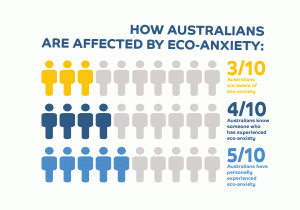
While the media have scooped up the term and it has become increasingly reported on, is Australia as open as it could be when talking about environment related anxiety?
About 17% of Australians who were aware of the term first heard it in a newspaper, and 16% on the radio. The majority reported that they first became aware of the condition through either Facebook (18%) or word of mouth (23%). However, the discrepancy between the levels of awareness and of experience of the condition indicates that a large number of Australians have personally experienced eco-anxiety, without necessarily knowing that it had a name.
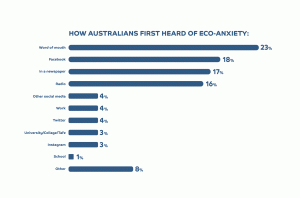
This lack of awareness may be in part due to our unwillingness to discuss a topic that may be subjective among our social circles. “I have to choose who I speak to about it… Many feel it’s just a “readjustment” rather than wanting to take account of reality. Some of these people I count as friends and in other facets of life they are reliable. It’s confusing and conflicting”. Sufferers not being able to openly discuss the condition may add to the already overwhelming feeling of helplessness that can accompany their anxiety.
It seems age plays a significant factor in both how we’re experiencing and communicating about eco-anxiety. Around 72% of Australians aged between 20 and 29 have personally experienced it, compared to about 50% of Australians aged over 30. Perhaps worrying still, around 67% of teens aged 16-19 have experienced eco-anxiety. A common symptom reported to have been experienced by these two under 30 age groups was an inability to concentrate at work or school.
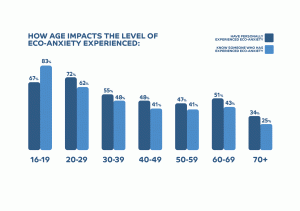
The question of how much parents realise any discrepancy between their own feelings towards the environment and their children’s may be one worth considering. Knowing someone else who has experienced eco-anxiety was much more common among young people (83% in the 16-19 age group and 62% in the 20-29 age group). This indicates a possibility that young people are communicating their feeling on the topic more freely with each other than with their parents or older people.
Parents of pre-teen children may also need to understand the potential impact that eco-anxiety could be having; “My children ask questions about the environment and they stress about the world”. Some have certainly noticed the anxiety their children may be feeling, but what can parents tell their children, especially amongst feelings of guilt, blame and helplessness? “Many children feel hopeless and don’t understand why we wouldn’t act to improve our world”. One respondent depicted a story of absolute desolation when describing the feelings of their 14-year old child; “{She} feels she won’t live to be older than 40 years old. She is preparing for a future she’s not confident she will have”.
So, you may be wondering if you yourself, or perhaps your loved ones, have felt any symptoms of eco-anxiety? With symptoms ranging from “Just a general unease” to “A feeling of impending doom”, there is certainly a broad spectrum of impact that eco-anxiety is having on our population. While one third of Australian sufferers report that it only has a minimal effect, 54% state that they have experienced eco-anxiety to some extent or moderately. The remaining, approximately 1 in 20 Australians, are experiencing eco-anxiety to a great extent. For this group, made up predominantly of residents from New South Wales and Victoria, 85% experience the symptoms of eco-anxiety every week, some every day, and some even continuously.
The list of symptoms that Australians reported having suffered include heart palpitations, sweating, fatigue, and shortness of breath. “I go blank when I have eco-anxiety, my brain can’t function properly, and I get the symptoms of heart attack sometimes”. Before more recent environmental events that have compounded across the country, reactions like this may have been seen by some as an anomaly. But in the wake of a season of ongoing drought, heat, dust, fire, flood and hail, Australians seem united in a new collective of unease. Of those among us that have experienced eco-anxiety, nearly half (48%) have had the inability to set aside a worry, 40% reported having insomnia or trouble sleeping, and 38% felt an excessive fear or feeling of impending disasters.
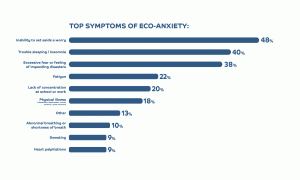
Perhaps unsurprisingly, bushfire was cited as the trigger for eco-anxiety by over 88% of sufferers. But besides the fact of the bushfires themselves, respondents also noted the significant role that the media played in affecting or increasing their anxiety. One respondent remarked “I had to turn off social media and stop watching the news because it upset me to the point of mentally affecting me in a negative, major way”.
Could Australia’s eco-anxiety have be amplified by a barrage of media influence throughout the summer season? For some, it seems that eco-anxiety has been a fleeting condition; “I am over it now because I was caught in watching too much media coverage” one respondent declared. The recent media coverage may have aggravated the anxiety for some, but for the vast majority of sufferers, their eco-anxiety was first experienced before September last year (2019).
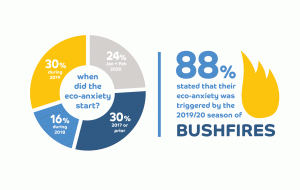
Australians living in rural areas are more likely to have had experienced eco-anxiety longer, with 41% stating that their experience started more than 2 years ago. In Australia, the indirect impact of climate change and environmental events on mental health is often associated with rural communities. However, the recent poll showed that of metro residents, 51% had personally experienced eco-anxiety, compared to only 46% of Australians in rural areas.
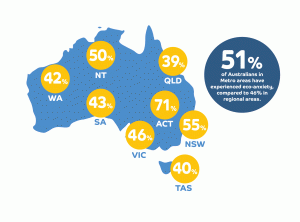
Debilitating and uncomfortable as it may be to the sufferers – could there be a silver lining to eco-anxiety? Fear is a great motivator to action, so could eco-anxiety in fact further progress Australia’s action towards combating climate change? “I was concerned about the environment prior to the fires, however the fires emphasised how real this actually is. I worry about my son and what his life will be like if we don’t do anything”.
Or, is this “just a time we would all like to get over and move forward from”, as one respondent put it. The extent of the issue may in fact seem so grand to us that we cannot get past the feeling of hopelessness; “No-one knows the answers. Most people agree there is a problem, but no-one is prepared to actually give up anything to slow climate change”.
One of the most iconic spokespeople on the topic of climate change, 17-year-old Greta Thunberg, summed up perhaps a common viewpoint amongst those of her generation, “Adults keep saying, we owe it to the young people to give them hope. But I don’t want your hope, I don’t want you to be hopeful, I want you to panic.”
Well, Australians are surely capable of a little panic? Perhaps knowing that there are more of us affected than we may have realised, can Australians unite their collective helplessness, and transform it into a collective power of change.
Survey conducted by Ekas with 1096 participants in Australian on 15/02/20.
